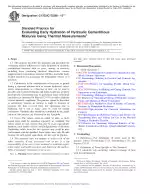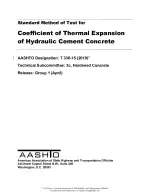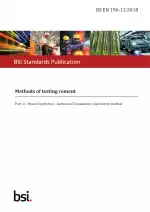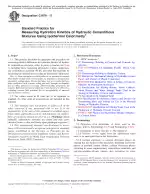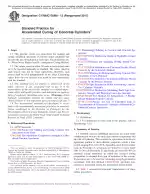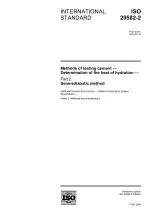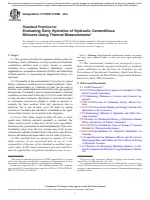ASTM C1753/C1753M-15e1 PDF Download
Standard EN SampleStandard Practice for Evaluating Early Hydration of Hydraulic Cementitious Mixtures Using Thermal Measurements
Also Known As:
ASTM C1753/C1753M-15e1 standard provides a means of assessing the relative early hydration performance of different cementitious mixtures compared to control mixtures. The practice involves measuring the temperature history of the test specimens after the addition of water to evaluate their hydration behavior.
Thermal profiles obtained through this practice can provide valuable information about setting characteristics, compatibility of different materials, sulfate balance, relative heat of hydration, and early strength development of the cementitious mixtures. By evaluating the effects of compositions, proportions, and time of addition of materials, as well as the initial mixture and test temperatures, thermal measurement testing can help identify performance sensitivities or trends. This can reduce the number of concrete test mixtures required for development and qualification, especially in variable ambient environments.
While the practice can provide insights into concrete problems such as slump loss, setting, and early strength, it should be noted that the results may not directly predict field concrete performance. Performance verification using concrete is necessary to quantify the trends observed through thermal testing. The practice can also be used to evaluate the effects of chemical admixtures on the thermal profiles of cementitious mixtures, aiding in dosage selection for different ambient conditions.
It is worth mentioning that thermal measurement testing described in this practice shares similarities and significance with isothermal calorimetry and some forms of near-adiabatic calorimetry. However, the choice of which practice or methods to use depends on specific applications and circumstances. Thermal profiles obtained through this practice may resemble isothermal hydration profiles obtained through Practice C1679, but they do not provide quantitative measurements of heat of hydration. Additionally, the thermal profiles are influenced by test conditions, mixture details, and exhibit greater variability compared to isothermal or near-adiabatic calorimeters.
To evaluate the potential for abnormal hydration, it is important to select test temperatures and initial mixture temperatures that represent the expected range of initial concrete field temperatures. This practice is not intended for benchmarking results across different laboratories using different equipment. It should not be used for quantitative measurements or corrected approximations of actual hydration heat and should not be cited in project specifications for acceptance or rejection of concrete. Instead, it serves as a simple and expedient tool for comparing the relative early-age hydration performance of specific combinations of materials prepared and stored under the same conditions.
| Descriptors | thermal test, test specimens, setting, supplementary cementitious materials,Admixtures,Cement,Chemical Admixtures,Hydraulic Cement,Curing,Hydration,Thermal Analysis |
| ICS Codes | 91.100.10 - Cement. Gypsum. Lime. Mortar |
| Language(s) | English |
| File Size | 1.1 MB |

